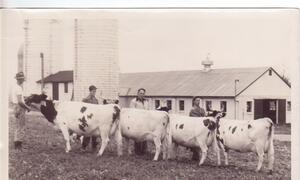Passover on the Farm
How many kids growing up in Baltimore City in the 1950s celebrated Passover on a dairy farm? How many little girls hunted for the afikomen in a house that had once been home to slaveholders? How many children heard the sounds of cows mooing when they opened the door for Elijah? Not too many, I reckon, but for the first 15 years of my life, our family seders were held on the dairy farm owned by my Great Aunt Sarah Mahr.
 Aunt Sarah (pictured) was what in her day was called “a maiden lady.” She helped her brothers run the Maryland paper Box Company, and in the early 1940s, she joined her younger sister and brother-in-law, Rose and Dan Raffel, in the dairy farming business. Having grown up in a row house on a street of classic Baltimore marble steps, neither Sarah nor Rose were likely prospects to become farmers, but first one and then the other fell in love with country living.
Aunt Sarah (pictured) was what in her day was called “a maiden lady.” She helped her brothers run the Maryland paper Box Company, and in the early 1940s, she joined her younger sister and brother-in-law, Rose and Dan Raffel, in the dairy farming business. Having grown up in a row house on a street of classic Baltimore marble steps, neither Sarah nor Rose were likely prospects to become farmers, but first one and then the other fell in love with country living.
In the late 1930s, my Great Uncle Dan, a Yale-trained biologist who had done post-doctoral fellowships in various European labs, concluded that anti-semitism would prevent him from having a successful academic career. He decided to apply what he knew about genetics to dairy farming; in 1937, he and Aunt Rose bought a stone farmhouse and milking barn about 20 miles from downtown Baltimore—a long way, both geographically and socially from the world they had grown up in. The only one of her parents' five children to graduate from college, Rose managed the chicken operation, the primary source of income in the beginning. Dan tried, with only occasional success, to make a living from the herd and eventually gave it up to become a high school science teacher.
Aunt Sarah had a full-time job as treasurer of the family business, which meant about an hour’s commute every day. She left the hands-on farming to Step-to and Eddie Washington, the black couple who lived in the tenant house. Step-to managed the dairy; Eddie was in charge of the kosher kitchen, which must have been strange for a woman born and bred in rural Virginia. I can only imagine what she was thinking as she kashered the kitchen each spring. Or what they thought when they assembled the haroset, bitter herb, and shank bone for the seder plate or served Passover dinner to the 15 to 20 of us seated in what had once been the summer kitchen and was now a large dining room.
I’m pretty sure I know what my Great Aunt Rose was thinking. Aunt Sarah and Aunt Rose loved each other dearly and as far as I know, their joint farming enterprise—“Rosardan Farms” — was conflict-free, but they never talked about religion (or politics). Although she rarely made the long trip to the nearest synagogue, Aunt Sarah was devout. A passionate Zionist, she had traveled to Palestine in the 1920s, not long after her fellow Baltimorean Henrietta Szold settled there. Aunt Rose and Uncle Dan, on the other hand, were atheists who had no use for any organized religion.
Childless themselves, they did value family and never missed a Passover seder. I suspect that my Aunt Rose (like my mother, who shared her views) was glad she couldn’t read or understand Hebrew. Of course, Aunt Sarah didn’t lead the seder; she left that to her brothers, but if they skipped so much as a word, she stopped them and made them go back. As a result, our seders were long affairs with only a few parts in English. I remember being restless and a bit bored — this was long before “relevant Haggadahs” — but also entranced by the setting.
When I was in high school, Step-to and Eddie retired. Aunt Sarah sold the farm and moved closer to town. Now our seders were held in a perfectly nice suburban house. When we opened the door for Elijah, we heard cars going by. Passover on the farm had become, and is to this day, a treasured part of my past.
Ellen K. Rothman is the former Deputy Director of the Jewish Women's Archive.







My mother and I visited with Aunt Min on occasion , dinners were wonderful. I remember the farm being near Prettyboy dam. ( son of Ethel Stern )
Enjoyed reading about the mahr family as I worked at Maryland paper box In the 1950's as their bookkeeper miss Sarah had my family to dinner When she lived at the farm. Thanks for writing about them and refreshing My memories
Lois Carey Phoenix,maryland
Our seder was vegetarian and included very little of the traditional Haggadah, but did include acting out the story, complete with Miriam's well (though without the plagues!). No cars went by when my youngest (with my supervision) opened the door for Eliahu, but there was a cool wind.
I enjoyed reading this El. Happy Passover!
~Dana
Thanks for this post, Ellen. As a descendant of Ukrainian Jewish dairy farmers (on my father's side), your post got me thinking about what my family's seders must have been like on the farm in the old country. I should try to dig up some history.